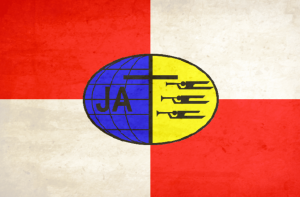AY Honors/Christian Citizenship/Answer Key/es
1
Banderas estatales
2
- a. Campamento
- b. Feria
- c. Programa del Día del Conquistador
- d. Desfile
Cuando marchando en un desfile, sólo hay una bandera que tiene pautas en cuanto a su ubicación. Esa bandera es la bandera de los EE. UU.
Al marchar con una sola fila de banderas, la bandera de los EE. UU. siempre está en el extremo derecho de la fila (como se ve desde la columna que sigue detrás de las banderas).
Cuando marchando con múltiples hileras de banderas, la bandera de los EE. UU. siempre está en la primera fila. La bandera de los EE. UU. también está sola en la primera fila. La bandera de los EE. UU. estará en la primera fila, al frente de la columna desde la posición central de la fila.
La bandera de los EE. UU. nunca debe ser inclinada en señal de respeto a un dignatario. Las banderas de los Conquistadores, JA, cristiana y estatales se inclinan cuando se da el mando de «vista a la derecha», pero la bandera de los EE. UU. debe mantenerse en posición recta.
3
Doblar
Adventist Youth Honors Answer Book/Flag folding/es
Note que la bandera se dobla de manera diferente cuando se prepara para izarla.
Protocolo de la bandera
Adventist Youth Honors Answer Book/Flag protocol/es
- Saludar la bandera
- Los civiles deben colocar la mano derecha sobre el corazón, excepto cuando usan ropa atlética, en cuyo caso deben quitarse el sombrero y estar en posición firme. Un saludo de mano no es necesario. Los hombres civiles que llevan los sombreros deben quitarse el sombrero y ponerlo en su hombro izquierdo, con la mano sobre el corazón. Los extranjeros deben simplemente quedar en posición firme. Por supuesto, los uniformados (incluyendo el uniforme de gala de Conquistadores) deben rendir el saludo militar. Cuando la bandera está en movimiento, como en un desfile, es correcto saludarla cuando esté a seis pasos delante de usted y mantenga el saludo hasta que pase seis pasos más.
La bandera nacional cuando en un poste siempre debe estar colocada a la derecha del orador (a la izquierda según se ve por la audiencia). Esto se puede verificar mediante la observación de los discursos del presidente de los Estados Unidos. La bandera está siempre a su derecha.
4
El Himno Nacional de los Estados Unidos de América es «The Star-Spangled Banner» (La bandera tachonada de estrellas). La letra fue escrita el 14 de septiembre de 1814, a bordo de una fragata británica en el puerto de Baltimore, donde el autor, Francis Scott Key (1779-1843) había sido detenido después de peticionar con éxito para la liberación de un amigo civil. Él se inspiró para escribir el poema cuando vio por la mañana la bandera de los Estados Unidos ondeando sobre el fuerte McHenry, que había resistido el bombardeo británico durante la noche anterior. Dispone de 4 estrofas y todos terminan en «O'er the land of the free and the home of the brave! (Sobre la tierra de los libres y el hogar de los valientes)», lo que significa que los Estados Unidos fue construida sobre los aspectos de la libertad y la independencia.
- The Star Spangled Banner
- O say, can you see, by the dawn’s early light,
- What so proudly we hailed at the twilight’s last gleaming,
- Whose broad stripes and bright stars, through the perilous fight,
- O’er the ramparts we watched, were so gallantly streaming?
- And the rockets’ red glare, the bombs bursting in air,
- Gave proof through the night that our flag was still there;
- O say, does that star-spangled banner yet wave
- O’er the land of the free and the home of the brave?
- Adaptación del himno en castellano adoptada por los inmigrantes latinoamericanos en Estados Unidos. Se estrenó en las protestas de inmigrantes en los Estados Unidos en 2006.
- Amanece: ¿lo veis a la luz de la aurora
- Lo que tanto aclamamos la noche al caer?
- Sus estrellas, sus franjas, flotaban ayer,
- En el fiero combate en señal de victoria.
- Fulgor de lucha, al paso de la libertad,
- Por la noche decían: «¡Se va defendiendo!»
- ¡Oh, decid! ¿Despliega aún su hermosura estrellada
- Sobre tierra de libres la bandera sagrada?
5
Derechos
Los ciudadanos de los Estados Unidos tienen el derecho de participar plenamente en el sistema político de los Estados Unidos (con la mayoría de los estados tienendo restricciones para los delincuentes, y una restricción federal sobre las personas naturalizadas para ser candidato para la presidencia y vicepresidencia de los Estados Unidos), están representados y protegidos en el extranjero por los Estados Unidos (a través de embajadas y consulados de los Estados Unidos), y se les permite residir en los Estados Unidos, y algunos territorios, sin ninguna clase de requisitos de inmigración. Éstos son algunos de los derechos que tiene como ciudadano EE. UU.:
- Libertad de la religión
- Libertad de reunirse
- Tener y llevar armas
- Libertad de expresión
- Libertad de prensa
- Protección de los acusados de crímenes
Responsabilidades
Los ciudadanos tienen el deber de servir en un jurado, si son seleccionados. También se exige a los ciudadanos a pagar impuestos sobre sus ingresos totales de todas las fuentes en todo el mundo, incluyendo los ingresos obtenidos durante su residencia en el extranjero (independientemente de la duración de la residencia). El gobierno de los Estados Unidos también insiste en que sus ciudadanos viajen dentro y fuera de los Estados Unidos con un pasaporte de los EE. UU., independientemente de cualquier otra nacionalidad que puedan poseer. Los hombres ciudadanos (incluyendo los que viven permanentemente en el extranjero y/o con doble nacionalidad) a registrarse en el Sistema del Servicio Selectivo a los 18 años para un posible reclutamiento en las fuerzas armadas.
6
7
8
8a
- «Estos son tiempos que ponen a prueba el alma de los hombres. El soldado en verano y el patriota en tiempos tranquilos se abstendrán en esta crisis de prestar servicios a su país; pero el que puede resistir ahora merece el amor y el agradecimiento de hombres y mujeres.» - Tomás Paine
- «No sé qué curso otros tomarán; pero para mí, ¡dadme la libertad o dadme la muerte!» - Patricio Henry
- «El temor es el fundamento de la mayoría de los gobiernos.» - Juan Adams
- «La Democracia son dos lobos y una oveja votando sobre qué se va a comer. La Libertad es la oveja, armada, impugnando el resultado.» - Benjamín Franklin
- «Sólo lamento tener una sola vida para darla a mi país.» - Natán Hale
- "We hold these truths to be self evident, that all men are created equal."- Thomas Jefferson
- Our flag is red, white and blue, but our nation is a rainbow - red, yellow, brown, black and white - and we're all precious in God's sight. - Rev. Jesse Jackson
- God grants liberty only to those who love it, and are always ready to guard and defend it. - Daniel Webster
- This nation can never be conquered from without. If it is ever to fall it will be from within. - President Abraham Lincoln
- The cost of freedom is always high, but Americans have always paid it. And one path we shall never choose, and that is the path of surrender, or submission. - John F. Kennedy
8b
- Jamestown, VA - first permanent English settlement in North America.
- Saint Augustine, FL - oldest continuously occupied European-established city and port in the continental United States.
- Plymouth, MA – where the pilgrims landed.
- Independence Hall, Philadelphia, PA – Where the Declaration of Independence was signed.
- Boston, MA – many historic events like the Boston Massacre and the Boston Tea Party.
- Lake Champlain, NY - site of a naval battle during the War of 1812.
- Statue of Liberty, New York, NY – Donated by the French to commemorate the centennial of the nation’s independence.
- Mt. Rushmore, Rapid City, SD – Monument with 4 presidents heads’ carved into rock; represents the growth of the US.
- Washington, D.C. – nation’s capital; many monuments.
- Gettysburg, PA –site of a historic Civil War battle.
8c
- Signing of the Declaration of Independence (1776)
- Revolutionary War (1776 to 1782)
- Ratification of the Constitution (1788)
- Washington becomes 1st president (1789)
- Lewis and Clark expedition overland to the Pacific Ocean (1804-1806)
- Civil War (1861 to 1865)
- Lincoln’s Gettysburg Address (1863)
- Lincoln’s Emancipation Proclamation (1863-freed the slaves)
- King’s “I Have A Dream” speech (1963)
- U.S. puts first man on the moon (1969)
- U.S. attacked by Al-queda (2001)
9
The best way to help either your church or your country is by getting involved. Edmund Burke, an English philosopher summed this up when he said "The only thing necessary for the triumph of evil is for good men to do nothing."
In your church, this means that you will show up for services on a regular basis. It also means you will support it with your tithes and offering, show up for business meetings, and not wait to be asked before you volunteer your services. If you see something that needs done, do it. If you do not have the skill to do it, or you think that you need permission first, talk to your pastor, an elder, deacon, or deaconess. Find your ministry!
For your country, it is much the same. Show up for public meetings, stay informed about the issues of the day, vote if you are eligible, and pay your taxes fairly and promptly.
10
To become a naturalized United States citizen, one must be at least eighteen years of age at the time of filing, a legal permanent resident of the United States, and have had a status of a legal permanent resident in the United States for five years less 90 days before they apply (this requirement is reduced to three years less 90 days if they (a) acquired legal permanent resident status , and (b) have been married to and living with a citizen for the past three years.) They must have been physically present for at least 30 months of 60 months prior to the date of filing their application. Also during those 60 months if the legal permanent resident was outside of the U.S. for a continuous period of 6 months or more they are disqualified from naturalizing (certain exceptions apply for those continuous periods of six months to 1 year). They must be a "person of good moral character" and must pass a test on United States history and government. Most applicants must also have a working knowledge of the English language (there are exceptions for long-resident older applicants and those with mental or physical disabilities), although this requirement is not intended to be an onerous one, since the test requires that they read and write simple sentences in English, such as "The United States is a democracy". However, some applicants fail the language and civics tests, and others are deterred from applying for naturalization by virtue of the test requirement.
11
Democracy in America is based on six essential ideals:
- People must accept the principle of majority rule.
- The political rights of minorities must be protected.
- Citizens must agree to a system of rule by law.
- The free exchange of opinions and ideas must not be restricted.
- All citizens must be equal before the law.
- Government exists to serve the people, because it derives its power from the people.
These ideals form the basis of the democratic system in the United States, which seeks to create a union of diverse peoples, places, and interests.
To implement its essential democratic ideals, the United States has built its government on four elements:
- Popular sovereignty, meaning that the people are the ultimate source of the government’s authority.
- Representative government, which means that the people delegate their powers to an elected official.
- Checks and balances; which means that there are three branches of government—the legislative, the executive, and the judicial— and they restrain and stabilize one another through their separated functions .
- Federalism, an arrangement where powers are shared by different levels of government. In the American federal system, the states and the national government divide authority. This division of power helps curb abuses by either the national or the state governments.
12
This verse teaches that governmental authority is to be respected, as long as it does not conflict with the moral obligations of being a Christian. Government serves a holy purpose; preserving social order, promoting the well-being of its citizens, and protecting their safety. If you believe that this does not apply today because you see the government as corrupt, you are urged to research the Roman government of the first century A.D. when these words were spoken by Jesus. Was Herod corrupt? Was Pilate just?
13
This question is answered beautifully by the Preamble to the Constitution of the United States of America
We the People of the United States, in Order to form a more perfect Union, establish Justice, insure domestic Tranquility, provide for the common defense, promote the general Welfare, and secure the Blessings of Liberty to ourselves and our Posterity, do ordain and establish this Constitution for the United States of America.
The Constitution is the supreme law of the United States, and the Preamble states its very purpose.
The Founding Fathers rocked.
References























































